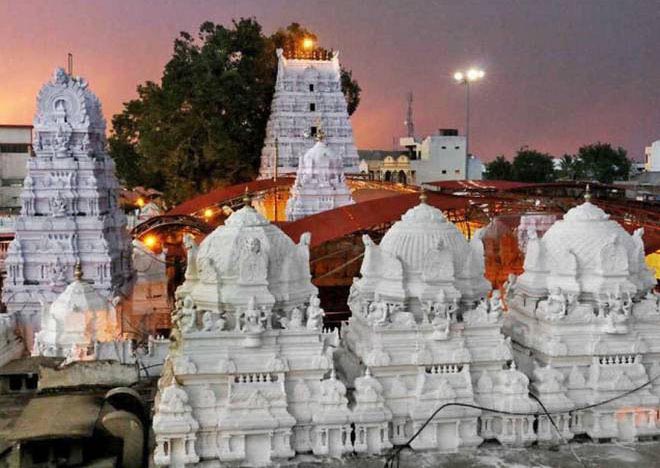Sri Raja Rajeshwara Swamy Temple

Information of Sri Raja Rajeshwara Swamy Temple, Vemulawada, Karimnagar, Telangana
Sri Raja Rajeshwara Swamy Temple is located in the holy village of Vemulawada, in the district of Karimnagar, in the state of Telangana, in South India. It is one of the famous and ancient Shivate temples in South India. This temple is locally known as the "Abode of Lord Eashwara". This shrine is popularly known for spiritual sanctity and architectural grandeur. The main deity of this temple is Lord Raja Rajeshwara. The idol is in the larger form of Neela Lohitha Siva Lingam that is usually known for His boundless benevolence in immediately fulfilling the wholehearted wishes of the adherent devotees.
Sri Raja Rajeshwara Swamy Temple Religious Significance
This temple is popularly called as "Southern Banaras" or "Dakshina Kasi". According to the local legends, the in main Temple complex has two Vaisnava Temples, Sri Seetharama Chandra Swamy Temple and Sri Anantha Padmanabha Swamy Temple. The Kesthra Palaka of this Temple is Sri Anantha Padmanabha Swamy which is being largely consecrated with festive rituals or Pujas related to both Shivate & Vaisnavate festivals. As per the religious scholars, an ample evidence for religious tolerance can be witnessed because of a dargah just within the precincts of the shrine stands tall from many centuries at this particular place.
Sri Raja Rajeshwara Swamy Temple Mythological Significance
As per Sthalapuranam, it has been mentioned in Bhavishyothara Purana that the Sun-God fully recovered from certain disability by wholeheartedly praying at this temple particularly, so this temple is largely termed as "Bhaskara Kshethram". It also cites that Lord Indra- the King of Astadikpalaka by worshipping devoutly Lord Sri Raja Rajeshwara-the primary deity of the temple was able to purify himself from different types of Brahmahatya Dosham with a lot of perfection.
Sri Raja Rajeshwara Swamy Temple History
Sri Raja Rajeshwara Swamy Devasthanam was successfully built by Raja Narendra during 750 to 973 AD. It is to be highly noted that Raja Narendra is the grandson of Parikshit and Arjuna. He dreamt of receiving order to build this temple from Goddess Sri Raja Rajehwari Devi and Lord Sri Raja Rajeshwara. Later the 'Siva Lingam' was obtained from the bed of the Pushkarni. It is to be remembered that this particular place was the capital city of the Vemulawada Chalukyas who in a successful manner ruled from AD 750 to AD 973. The ancient name of this village was Lemulavatika. This particular name was identified from Rock cut inscriptions found at this village.
Sri Raja Rajeshwara Swamy Temple Architectural Significance
On the bank of a large Tank, the shrine stands picturesquely. The tank is known as Gudicheruvu. The Mahamandapam or Garbha - Griha has "Sri Lakshmi Ganapathi". On the other hand, Lord Raja Rajeshwara is in the usual form of Neelalohitha Siva Linga. Directly facing the lord is the idols of Goddess Nandeeshwara and Sri Raja Rajeshwari Devi. The sanctum sanatorium perfectly encloses Sri Anjaneya Sahitha Kasi Visweswara Swamy, Sri Seetharama Chandra Swamy Temple and Sri Anantha Padmanabha Swamy Temple. The other important temples situated within the temple complex are Sri Kala Bhairava Swamy Temple, Sri Dakshina Murthy Temple, Kotilingalu, Sreeevalli Devasena Sametha Subramanya Swamy Temple, Sri Mahisasura Mardhani Temple, Sri Bala Tripura Sundari Devi Temple; Sri Uma Maheshwaralayam and Sri Someshwaralayam.
Festivals at Sri Raja Rajeshwara Swamy Temple
During the major and minor Hindu festivals, Sri Raja Rajeshwara Swamy Devasthanam is marked with different types of pujas and rituals such as Nishikala Puja, Pradosakala Puja, Madhyahnika Puja and Chatukala Pujas. Most of the rituals and Pujas are performed as per Pancharathra Agama. The main festivals of this temple are Mahasivarathri JathraMahasivarathri Jathra, Sreerama NavarathrotsavamsSreerama Navarathrotsavams, Sri Thyagaraja Aaradhanotsvam, Sri Geetha Jayanthi, Sri Siva Kalyanotsavam, Sri Sankara Jayanthi, Sri Hanumath Jayanthi; Sri Devi Navarathrotsavams; Sri Ganesha Navarathrotsavams; Deepavali; Kartheeka Masotsavam and Sravana Masotsavam.
- Andhra Pradesh Temples
- Assam Temples
- Bihar Temples
- New Delhi Temples
- Goa Temples
- Gujarat Temples
- Jammu and Kashmir Temples
- Karnataka Temples
- Kerala Temples
- Madhya Pradesh Temples
- Maharashtra Temples
- Odisha Temples
- Punjab Temples
- Rajasthan Temples
- Sikkim Temples
- Tamil Nadu Temples
- Telangana Temples
- Uttar Pradesh Temples
- Uttarakhand Temples
- West Bengal Temples